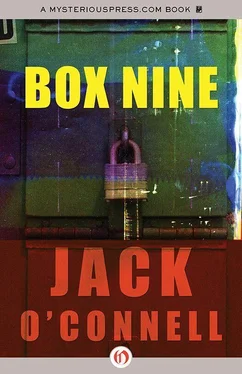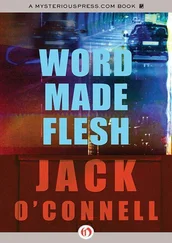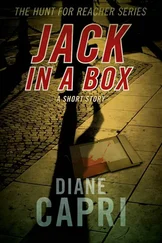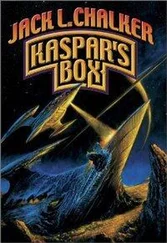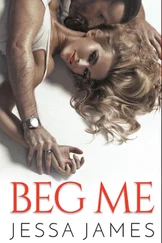“This way,” he says, and this time she can tell the sound of his voice is coming directly from his mouth, not a hidden speaker system. She enters the library. It’s an enormous room, probably consists of more square footage than the entire green duplex, her place and Ike’s combined. All four walls are made of built-in bookshelves, floor to ceiling. All of the shelves are empty and covered with dust.
The rest of the room is almost empty. The floor is covered by two gigantic braided rugs. There are no windows. There is one break in the shelving to allow for a small fireplace and mantel. The remains of a fire are smoldering on the andirons. There’s a single, low-to-the-ground, overstuffed rocking chair, covered in a faded, soft-grey material. The chair sits facing and to the left of the fireplace. It looks a bit out of place in the room, like it came from a garage sale or had been passed down through several generations.
The only other piece of furniture is something big and bulky that’s been covered by a plain white bed sheet. It’s pushed up against a wall to the left of the rocker. Hung on the wall above the mantel is a large, iron-looking crucifix, a grotesque-style Christ figure, bent and broken, iron droplets and running lines of blood covering the body. Below the crucifix, resting on the mantel itself, are small wooden boxes standing upright to reveal their contents — a mishmash of pebbles, shells, watch faces, string, eggs, shards of a broken mirror, a doorknob. Lenore has an urge to walk over to them and study them more closely.
“My own feeble attempts,” Cortez says. “An old hobby of mine.”
He’s standing at the top of a wrought-iron platform that rises from a tiny spiral staircase mounted in the very center of the room. Lenore approaches the miniature stairway and looks up. There’s an open skylight cut into the ceiling of the building. Cortez is peering into a telescope that juts out of the skylight. He’s being pathetically careless, Lenore thinks. Could he actually trust me?
“Come up, please,” he says. “I want to show you something.”
She looks around the room, then climbs the seven stairs and joins him on the circular platform. He brings his head up from the telescope and stares, then, slowly, smiles at her. “Which one of us can resist saying it?” he asks.
“Excuse me,” she says.
He tilts his head back slightly, puts a theatrical and self-mocking hand on his chest, and says, “We meet at last.”
“Had to happen sooner or later,” she says.
Up close, he’s a little more breathtaking than Lenore was prepared for. He’s tall, probably about six five or so, with large eyes that contain blue and grey and green and dominate the face. He has the most ingratiating grin she’s ever witnessed, with a small gap between his two front teeth that enhances rather than detracts from his attractiveness. He has a thick, woodsman beard that covers the whole second half of his face, black with random strands of grey starting to break through here and there. His hair is jet-black and a bit too long, she thinks, and he parts it to the left in a big sweeping arc. He speaks in a rich, almost echoing baritone, like a well-trained actor with a natural sense of timing. There’s a strong hint of a Spanish accent, but also something beyond that, something clearly more foreign, distant, impossible to place.
“Just like in the movies,” he says.
“What happens when it rains?” she asks, pointing upward with her thumb.
“There is a cover,” he says, not raising his head from the eyepiece. “What the architect called a bubble. I’ve always liked that. ‘A bubble’.”
She looks down at the telescope, and though she knows nothing about the equipment, she’d bet it was a state-of-the-art model, probably costing more than she makes in a year.
“So,” she says, “is this for real? Is this some kind of prop or are you really into astronomy?”
He can’t seem to get away from the self-mockery. “I’m a man of many interests and many talents.”
“Don’t be so hard on yourself. We’ve got to pump you up a little.”
“The problem is, the sky in Quinsigamond is so obscured by all the light. Cities are horrible places, don’t you think?”
“I’m a hometown girl, you know. I’ve got a soft spot. I’m a city girl.”
“Where I come from, a town called Banfield, you could go into the fields at night and the sky would be infested with the stars. ‘Infested with the stars’— plagado de las estrellas.”
“Sounds like a disease.”
He sighs. “I have an evil talent for making the beautiful sound horrid.”
She shrugs. “That could come in useful. Dissuade people from things that you don’t want them to go near.”
“There’s no need for that. I’ve always been a man willing to share.”
Lenore doesn’t know how to respond. She pauses and then says, “That’s a chapter in the myth that I’m unfamiliar with.”
He laughs, peers down into the eyepiece. “That I’m a generous man? You’ve been misinformed. You can’t always believe what you hear.”
“Or what you see. Or touch.”
“Or taste.”
He looks up from the telescope and they stare at each other in silence for a moment.
He clears his throat and says, “By the time I was ten, I knew the surface of the moon better than most children know the village they live in. At twelve I could name most of the constellations. I once asked my mother if heaven was near Orion.”
“What did she say?” Lenore asks, genuinely wanting to know.
“I honestly don’t remember. It was so long ago.”
“I would think that would be the type of thing you would remember.”
“Memory is a pathetic tool. It never works the way it should. It’s rarely useful. It brings more pain than pleasure.”
“Memory has never brought you comfort?” she asks.
He lets a slow but huge smile grow on his face, then says, “Not that I recall.”
She rolls her eyes and says, “Bring out the big hook.”
“Do you want to take a look?” he asks, motioning to the telescope.
She nods, leans down over the eyepiece, and squints. At first she can’t see a thing.
“It’s not very clear,” he says. “Too much cloud cover.”
She brings her head back up, unsuccessful. “What should I have seen?”
“Surface of the moon,” he says. “Sea of Vaporum. Wonderful name.”
He turns and starts down the stairway and she follows.
Back on the floor, they stand facing each other. He puts his hands on his hips and says, “You’ll have to excuse the way I’m dressed. I believe in comfort at home. And, of course, I wasn’t expecting company tonight.”
He’s got on a pair of grey sweatpants that bunch around the ankles, a black crew-neck cotton sweater, and a pair of ratty, five-and-dime-store slippers.
“You look fine,” she says, and feels a wince of embarrassment.
“Could I offer you a drink?” he says. “I’m allowed a single nightcap, myself, due to my condition.”
“Your condition?”
“Addison’s disease. I believe your President Kennedy suffered from this also, yes?”
“I really don’t know. I’m sorry to hear—”
“Please take a seat,” he says, cutting her off and extending a hand toward the rocking chair. He starts to move toward the fireplace. She follows, and remains standing behind him. He grabs a short poker from the brick patch of flooring that extends a few feet out from the hearth and begins to jab and stir the embers and charred remains of wood.
“Sit,” he says in a soft voice, and she hesitates and then eases herself into the chair. She sinks into its cushions. It’s tremendously comfortable and she can see why it would be hard to part with or even alter.
Читать дальше
